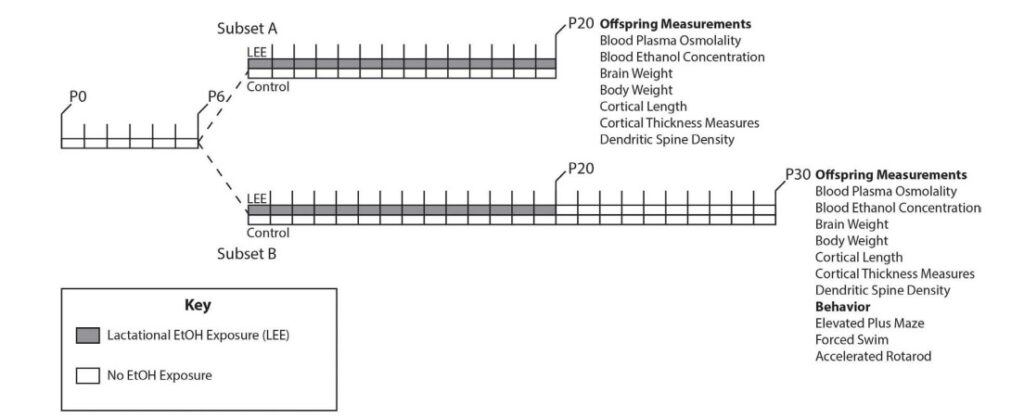April 22th, 2023
Author: Manish Verma
Editor: Dr. Jitendra Kumar Sinha
Breastfeeding is often touted as the best way to provide optimal nutrition for newborns, but what about when alcohol is involved? Expecting parents strive to provide the developing fetus with the best possible care. This includes taking prenatal vitamins, maintaining a healthy diet, and getting adequate rest. However, it is crucial to address the issue of alcohol consumption during pregnancy, which remains prevalent despite its known risks. In the United States alone, over 10% of pregnant individuals report drinking alcohol. Prenatal exposure to alcohol can have severe consequences, such as developmental delays and lifelong disabilities. According to a study on mice, exposure to alcohol through breastmilk can cause stunted growth of the brain and body, along with reduced cortical length, leading to potentially lasting implications. In this article, we will explore the impact of prenatal alcohol exposure and the importance of refraining from alcohol during pregnancy.
Alcohol has been established as a developmental teratogen in mammalian systems, with most research efforts concentrating on prenatal exposures. Fetal Alcohol Spectrum Disorders (FASD) are known to arise in offspring due to maternal alcohol consumption during pregnancy, leading to the manifestation of physical, cognitive, emotional, and behavioral phenotypes related to the exposure. Consequently, the Centers for Disease Control and Prevention (CDC) have issued a statement indicating that “any level of alcohol consumption during pregnancy carries potential risks, and therefore, must be avoided.”

In general, guidelines for abstinence from alcohol consumption during pregnancy are adhered to, resulting in reduced alcohol consumption among pregnant women. Nevertheless, in certain populations, alcohol intake levels increase to preconception levels shortly after birth. Furthermore, the proportion of breastfeeding mothers who consume alcohol is considerable, with rates of approximately 20% in Canada, 36% in the United States, and 60% in Australia.
Breastfeeding mothers who consume alcohol expose their infants to teratogenic substances, which can have serious consequences. Alcohol levels in breast milk can reach their highest point between 30 to 60 minutes after consumption and remain detectable for up to 2-3 hours. While these levels are lower than that in alcoholic beverages, they are not negligible. Such exposure can cause reduced body mass and verbal IQ scores in infants.
Studies have shown that infants exposed to alcohol via breast milk may experience reduced cognitive function, lower academic abilities, and deficits in abstract reasoning skills. Additionally, changes in sociability can occur, potentially impacting personal-social interactions. It’s concerning that despite scientific evidence highlighting the potential negative effects of alcohol in breast milk on offspring development, many new mothers continue to consume alcohol while breastfeeding.
However, despite the potential risks, little emphasis has been placed on educating new parents about alcohol consumption while breastfeeding. This is partly due to a paucity of research on lactational ethanol exposure (LEE) effects in children.
Recently, a study conducted by the research team at the University of California, Riverside, aimed to investigate the impact of lactational ethanol exposure (LEE) on offspring development.

A novel postnatal alcohol exposure model was developed in breastfeeding mice, where offspring were exposed to ethanol via nursing from postnatal day (P) 6 through P20 (weaning), equivalent to infancy in humans.
The results showed that LEE mice had reduced body and brain weights, as well as decreased neocortical lengths at weaning, continuing through to early puberty (age P30), when compared to the control group. Males showed reduced brain weights in both age groups, while females’ brain weights were reduced at P20, but they recovered to control levels at P30. These findings suggest that LEE has sex-specific differences that need to be further explored.
According to the author, the decreased body weights observed in both male and female mice at postnatal days 20 and 30 due to lactational ethanol exposure align with findings from human studies, where infants exposed to alcohol through breast milk have shown lower body weights and growth patterns. These observations may be attributed to impaired nutrient extraction by the gut. This is potentially due to the inhibitory effects of alcohol on protein synthesis in the small intestine, leading to reduced absorption of both micro- and macronutrients.
Moreover, explorations on neocortical characteristics discovered that LEE males had reduced frontal cortex thickness in comparison to controls. Examinations of dendritic spines in the prelimbic subdivision of the medial prefrontal cortex showed a trend of decreased densities in LEE mice. Also, findings from behavioral tests suggested that LEE mice demonstrated higher risk-taking behavior, abnormal stress regulation, and increased hyperactivity.
Considering these findings, it is crucial to prioritize the health and well-being of both mothers and infants. Additional research is needed to better understand the mechanisms underlying LEE’s impact on brain development and behavior. Until then, education and awareness campaigns can play a vital role in empowering new parents with the information they need to make informed decisions about alcohol consumption during breastfeeding. By working together, we can ensure that future generations have the best possible start in life.
REFERENCES:
- Perez, R. F., Jr, Conner, K. E., Erickson, M. A., Nabatanzi, M., & Huffman, K. J. (2023). Alcohol and lactation: Developmental deficits in a mouse model. Frontiers in neuroscience, 17, 1147274. https://doi.org/10.3389/fnins.2023.1147274
- Gibson, L., & Porter, M. (2020). Drinking or Smoking While Breastfeeding and Later Academic Outcomes in Children. Nutrients, 12(3), 829. https://doi.org/10.3390/nu12030829
- Bottom, R. T., Kozanian, O. O., Rohac, D. J., Erickson, M. A., & Huffman, K. J. (2022). Transgenerational Effects of Prenatal Ethanol Exposure in Prepubescent Mice. Frontiers in cell and developmental biology, 10, 812429. https://doi.org/10.3389/fcell.2022.812429
- Bottom, R. T., Abbott, C. W., 3rd, & Huffman, K. J. (2020). Rescue of ethanol-induced FASD-like phenotypes via prenatal co-administration of choline. Neuropharmacology, 168, 107990. https://doi.org/10.1016/j.neuropharm.2020.107990
- Conner, K. E., Bottom, R. T., & Huffman, K. J. (2020). The Impact of Paternal Alcohol Consumption on Offspring Brain and Behavioral Development. Alcoholism, clinical and experimental research, 44(1), 125–140. https://doi.org/10.1111/acer.14245